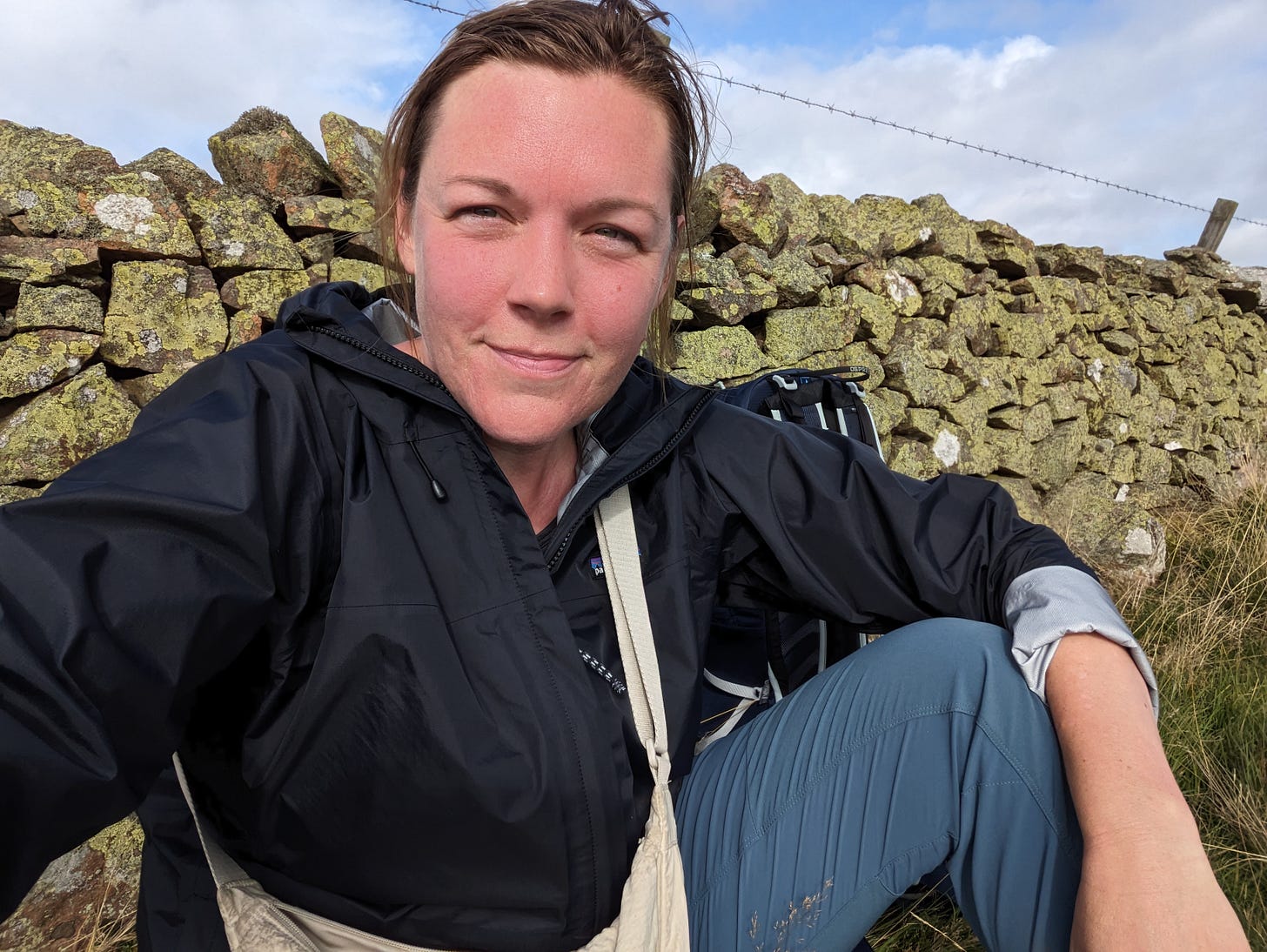The privilege of pilgrimage
Unpacking some thoughts on how pilgrimage is often put on a spiritual pedestal, when it is not equally accessible to all...
On day three of my pilgrimage along St Cuthbert’s Way, I sat on a rock and scribbled some notes in a page of my Vade Mecum. At the top I wrote in capitals: PILGRIMAGE AND PRIVILEGE.
Let me start by being really honest about what it look for me to do that walk:
Money. It might be “just” walking, but this was not a free trip by any stretch of the imagination. It took flights to the UK from Copenhagen, trains to and from the start and end points, overnight accommodation (which ranged from hostels to B&Bs to cheap hotels), a guide across the tidal part of the walk, and my food and drink each day. I haven’t added it all up exactly, but it was many hundreds of pounds.
Supplies. Which, of course, means more money. I had a hiking backpack, hiking boots (the good ones, coz when I tried a multi-day walk with cheap boots I lost two toenails…), a high-end waterproof coz there is nothing worse than being wet for hours, waterproof trousers, sports clothing underneath, dry bags inside the rucksack… I could go on.
Time. I am self-employed, which means I manage my own diary and have perhaps more flexibility to take time off than those with fixed holiday allowance. But that also means no one is giving me holiday pay. Time off is time not earning anything, but I was able to make that decision.
Health. I am not super fit, but I am relatively healthy. I have no chronic illness or long-term injuries. I am not currently disabled in any way. I could do minimal training and still manage over 20km a day over some steeps hills for five days.
Support. I have two school-age kids (9 and 7), and the way our family life is currently set up, I look after them from 3-6pm most days. I have a husband who, when I announced I’d be leaving them for ten days, absolutely took it in his stride and managed the additional childcare and the household tasks that are normally mine on top of his normal share and his full time job. That was tiring for sure, but he has the health and capacity to do it from time to time.
There’s probably more that I’m forgetting right now, but I want to simply make the point that I needed so many factors to be in my favour for me to be able to do this pilgrimage. It was a huge privilege.
And yet, I have noticed in some circles that pilgrimage has become the top of a spiritual practice pyramid.
I think there are lots of factors involved in that, including the wider cultural attraction of long walks more generally (hello Reese Witherspoon in Wild) and the idea of needing to get away from it all into the most wild place you can imagine to refuel (thanks instagram for so many mountain-top reels).
From a religious perspective, I think it is linked to the re-engagement with contemplative practices we’ve seen over the last decade in particular. I’m really excited about that movement for the most part, and yet we are human, so we naturally begin to put everything into a hierarchy. In some traditions, you might have speaking in tongues or prophecy up there at the top; in others it might be going to seminary and having all the theology degrees; in others still it might be being the worship leader with a big band and smoke machines.
I believe, in the modern contemplative expression of Christianity, pilgrimage has often been put right at the top and we are subtly encouraged to think that there is an element of spirituality that we cannot access, if we have not been on pilgrimage.
Does that thought resonate with you at all?
I am definitely guilty of buying into this way of thinking and probably also of perpetuating it - I am writing this very aware of those things.
I first was attracted to the idea of pilgrimage as a metaphor, a way of understanding the way we journey with the Divine through our lives, through different seasons and landscapes. It was only later that I wondered what it would be like to actually go on pilgrimage.
I do love it. I loved the experience last month of walking alone day after day in beautiful landscapes. There was something healing and liberating about the experience for me, in ways I am still processing and unpacking.
But it cannot be true that those things are only accessible through the kind of pilgrimage I did, because if so, only a small minority of people can ever access them.
I’m not remotely interested in an expression of faith that puts God somewhere that few can actually reach.
It’s why, when I started working in this space, I branded my work “Ordinary Pilgrim”. The ordinary part is really important, because it became so clear to me that the kind of spirituality I was pursuing was one that was deeply grounded in the ordinary everyday life I have right now - in an embodied, land-rooted and kin-connected expression - not in transcendent other-worldly experiences.
Even the meaning of this most recent pilgrimage, I am keenly aware, is not in the actual moments walking across the heights of the Cheviot hills or through two inches of tidal water across the sands to Lindisfarne, but in how those moments continue to unfold in me now that I am back home. What does it mean for my life right here, in a bungalow in a suburb of Copenhagen?
Where does that leave me? I still love pilgrimage. I will plan more walks in the future, both one-day and multi-day walks. I will prepare to hopefully have the time and money and health to do them.
But also, I want to pay attention to how I talk about the practice of pilgrimage, and look for ways to make it more accessible.
I want to be part of re-imagining how pilgrimage can be a part of anyone’s spirituality, no matter their circumstances.
And I want to disrupt any suggestion that someone who has gone on a multi-day walking pilgrimage has had a better or more spiritual experience than anyone else.
This is the definition I use for pilgrimage (muddled together from multiple sources):
A pilgrimage is a journey of sacred encounter.
It brings us beyond the known world of our everyday lives and into foreign territory that calls forth the vulnerability and open-heartedness that allows for sacred encounter and transformation.
May I be part of making that journey available to everyone who wants to undertake it.
I’d love to hear your thoughts… do you resonate with this idea of pilgrimage at the top of the spiritual practice pyramid? What would make pilgrimage an accessible practice for you? And what have I missed?
P.S. If you’re heading off on pilgrimage soon (of any kind and length) and would like someone to companion you in your preparation, your journeying, and your returning, I offer spiritual direction packages for pilgrimage. Find out more on my website.








Hi Fiona, some of your thoughts really resonate in beautiful ways with me, but I had not realised that pilgrimage is a 'top spiritual practice' before! It has seemed to me more like simply something for the peculiar few who want to do challenging holidays on foot instead of in some comfort based location or ease-full activity. I count myself as one of those 'peculiars'! Nevertheless, the 'finance/time' claims (etc?) are probably true to life. Are you interested in my perspective on my walking travels? This is my last blog post of a longer route, Iona to Lindisfarne, which takes in the St Cuthbert's Way at the end. My longing for 'ordinary life' to be nurtured by my pilgrimage experiences was part of my motivation in undertaking the walk, and I suppose that this is like anything I choose to do for reasons of turning my heart again and again to God (or to joy/ love/ life/ service/ creative expression/ silence ...). https://www.exploringheartandvoice.com/post/day-24-lindisfarne-and-home.
I really resonate with this. I walked a few days of the camino de Santiago this year and can recognise that 'proper' pilgrimage is not available to everyone for all the reasons you state. I am new to the contemplative Christian world so I'm not sure I've picked up on that hierarchy yet but I'm sure it's there. I'm interested in your thoughts on making it an accessible practice and I guess your definition provides a good starting point to imagine that